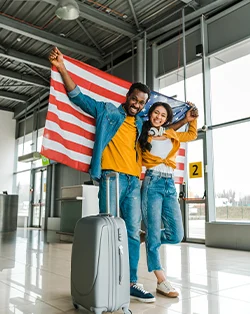What Is a U.S. Entry Waiver?
Trusted by Canadians for Secure US Waiver Services
Eligibility Check
Document Collection
- Court records or police clearance
- Government-issued ID or passport
- Proof of ties to your home country
- Previous immigration paperwork (if any)
Complete Form I-192
Prepare Your Case File
Submit Your Application
Background Check & DHS Review
Who Needs a Waiver?


How Do You Check the Status of Your U.S. Entry Waiver Application?
- Go to the USCIS Case Status Online Tool.
- Enter your 13-character receipt number (found on your application notice).
- Review your current case status such as “Case Received,” “Request for Evidence,” or “Case Approved”. Note: Processing times can vary widely — from a few months to over a year — depending on the complexity of the case and the reviewing agency.
Essential Documents for U.S. Entry Waiver
Completed Form I-192
Valid Government-Issued ID
RCMP Criminal Record Check (Canada Only)
Court Documents
Personal Statement (Letter of Explanation)
Proof of Rehabilitation (if applicable)
Proof of Purpose for Travel
- Family invitation letters
- Business letters or conference invites
- School enrollment or medical documents
Biographic and Immigration History
Please contact us for details about the application process and applicable fees.
Frequently asked questions
Who needs a U.S. Entry Waiver?
Anyone who has been found inadmissible to the United States due to criminal history, immigration violations, or prior deportation needs a waiver to enter legally.
How long does it take to get a U.S. Entry Waiver?
Processing times vary but typically range from 6 months to over 1 year. Delays can occur depending on the complexity of your case and the reviewing agency’s workload.
How long is the waiver valid?
Waivers are usually granted for 1 to 5 years, depending on your case and risk level. You can reapply for renewal before it expires.
Can I enter the U.S. while my waiver is pending?
Yes, but many applicants choose to work with professionals to avoid mistakes, delays, or rejections. A well-prepared application increases your chances of approval.
Can I apply on my own?
Yes, but many applicants choose to work with professionals to avoid mistakes, delays, or rejections. A well-prepared application increases your chances of approval.



